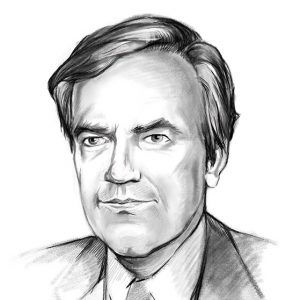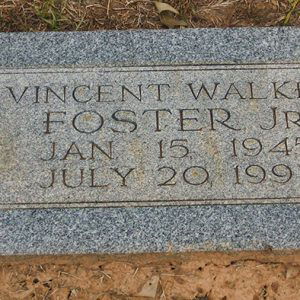calsfoundation@cals.org
Vincent Walker (Vince) Foster Jr. (1945–1993)
Vincent Walker Foster Jr. was a prominent Little Rock (Pulaski County) lawyer and close friend and associate of Bill Clinton and his wife, Hillary Rodham Clinton. Although he had a distinguished legal career in Arkansas, he became a historically important figure for the last six months of his life, when he was deputy counsel for the White House in the administration of President Clinton. Despondent over the political turmoil in which he became involved, Foster committed suicide in a suburban Virginia park, triggering a series of investigations that became part of what was popularly called the “Whitewater scandal.”
Vince Foster was born on January 15, 1945, to Vincent W. and Alice Mae Foster in Hope (Hempstead County), where his father had a real estate business. He had two sisters. His life was yoked to Bill Clinton’s almost from the beginning. Their friendship began in kindergarten at Miss Marie Purkins’ School for Little Folks. A famous class picture shows Foster and Clinton standing together a few feet away from another lifetime friend of both, Mack McLarty.
Foster was president of his senior class at Hope High School and graduated in 1967 from Davidson College near Charlotte, North Carolina, with a bachelor’s degree in psychology. He entered Vanderbilt University Law School at Nashville, Tennessee, but he joined the Arkansas National Guard during the Vietnam War and transferred to the University of Arkansas School of Law in Fayetteville (Washington County) so that he could participate in the weekend training in Hope. He graduated first in his law school class in 1971 and had the highest score on the state bar examination. He also was managing editor of the Arkansas Law Review at the university.
While a student at Davidson, Foster met Elizabeth Braden of Nashville, Tennessee, whom he married in April 1968. They had three children.
Foster joined the Rose Law Firm in Little Rock in 1971 and soon established a reputation as one of the most successful trial litigators in the state. He became a full partner three years later. The following year, he went to Fayetteville for a meeting of the Arkansas Bar Association, and there he met Hillary Rodham, who had recently married Clinton. Foster urged his firm’s partners to hire her after Clinton was elected attorney general and the couple moved to Little Rock. The two worked together on many cases and became close confidants.
Although Foster had had little experience in politics or government except for some advisory work for the Clintons during the presidential campaign, Bill Clinton asked him to join his administration in 1993 as deputy White House counsel. Foster participated in the vetting of two nominees for attorney general, whose nominations were withdrawn owing to revelations that they had hired undocumented immigrants for house work, as well as a nominee for assistant attorney general for civil rights whose appointment Clinton later withdrew. The crowning event was the firing of the staff of the White House travel office, which brought criticism that the staff was fired to make way for Clinton friends to get the travel business. The Wall Street Journal carried several editorials attacking Foster, once because he had not sent a photograph of himself to the paper as it had requested under the Freedom of Information Act. On the morning of July 19, 1993, the Wall Street Journal carried another editorial attack on him, which questioned “the mores on display from the Rose alumni.” Depressed by these attacks, Foster obtained a prescription for a mild anti-anxiety pill.
Exactly six months after Clinton’s inauguration, on July 20, Foster left the White House and drove to Fort Marcy Park, a small military park in suburban Virginia, and shot himself with a pistol that had belonged to his father. The discovery of Foster’s body set off a firestorm. There were rumors, widely published and broadcast, that he was murdered and his body moved to the park, that he was engaged in various plots, and that he had been having an affair with Hillary Clinton. The suicide stunned the Clintons, and morale at the White House sank. The White House handling of records in Foster’s office in the days after his death—the chief counsel forbade investigators to see documents in his office until he had gone through them and separated confidential documents—proved to be the most damaging mistake.
A note found in pieces at the bottom of a briefcase in his office read, “I was not meant for the job or the spotlight of public life in Washington. Here ruining people is considered sport.” It said of the Wall Street Journal: “The WSJ editors lie without consequence.”
A set of billing records of the Rose Law Firm for the defunct Madison Guaranty Savings and Loan, which Foster had collected to prepare the Clintons’ defense against the Whitewater scandal during the campaign, was moved to the White House living quarters after Foster’s death and then disappeared for a period. This mishandling of records, coupled with various Whitewater-related accusations, fueled calls by Republicans for Attorney General Janet Reno to appoint an independent counsel to investigate Foster’s death, among other matters. In January 1994, Clinton relented and told Reno to appoint an independent counsel.
The first special counsel, Robert B. Fiske Jr., concluded that Foster had committed suicide from depression, the same conclusion that the federal park investigators had reached, and he found no wrongdoing by the Clintons. But before his investigation was completed, the panel of federal judges overseeing independent counsels removed Fiske, and Kenneth W. Starr, the solicitor general under President George H. W. Bush and a critic of Clinton, was appointed. Starr investigated Foster’s death a third time and eventually also concluded that it was a suicide. But the “Whitewater investigation,” as it was called, went on another seven years and led to the impeachment of Clinton.
Foster’s funeral was at the Cathedral of St. Andrew Catholic Church in Little Rock. He is buried in Memory Gardens Cemetery in Hope. Friends and legal associates raised money to establish an endowed chair at the University of Arkansas School of Law, the Vincent Foster University Professor of Legal Ethics and Professional Responsibility.
For additional information:
Bernstein, Carl. A Woman in Charge: The Life of Hillary Rodham Clinton. New York: Alfred A. Knopf, 2007.
Boyer, Peter J. “Life after Vince.” The New Yorker, September 11, 1995, pp. 54–59.
Brummett, John. “The Numbing News from Washington.” Arkansas Times, July 29, 1993, pp. 11–12.
Clinton, Bill. My Life. New York: Alfred A. Knopf, 2004.
Clinton, Hillary Rodham. Living History. New York: Simon & Schuster, 2003.
Conason, Joe, and Gene Lyons. The Hunting of the President: The Ten-Year Campaign to Destroy Bill and Hillary Clinton. New York: St. Martin’s Press, 2000.
DeParle, Jason. “A Life Undone: Portrait of a White House Aide Ensnared by His Perfectionism.” The New York Times, August 22, 1993, section 1, p. 1.
Haman, John. “The Vince Foster Report.” Arkansas Times, July 14, 1994, pp. 11–13.
Office of the Independent Counsel. “Report on the Death of Vincent W. Foster, Jr.” October 10, 1997. Online at http://www.washingtonpost.com/wp-srv/politics/special/whitewater/docs/foster.htm (accessed April 6, 2022).
Ernest Dumas
Little Rock, Arkansas









Comments
No comments on this entry yet.